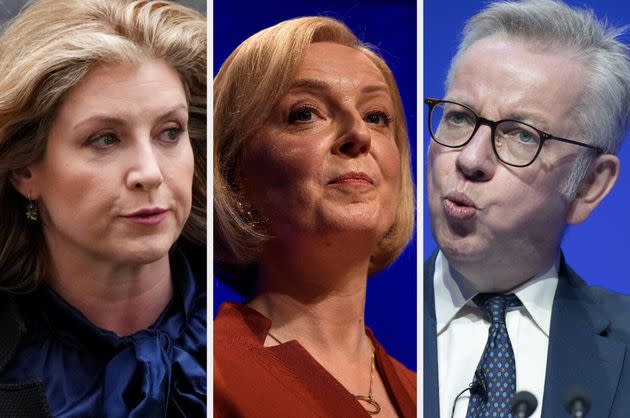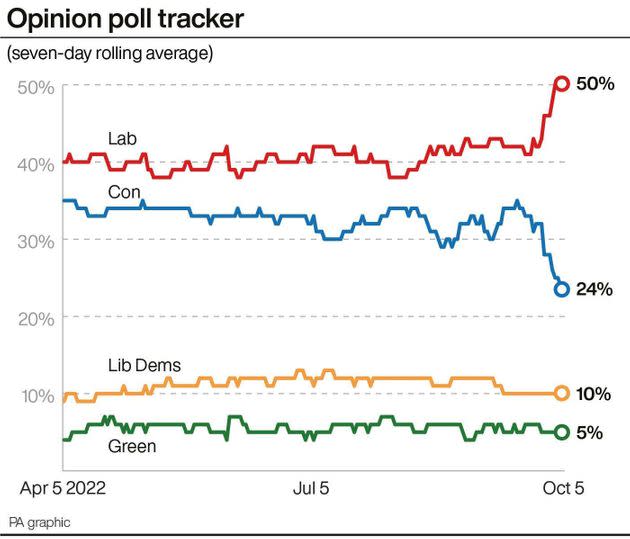So Why Are All The Tories Fighting Again?

Liz Truss is already facing push-back from other Tory MPs over her policies (Photo: Getty)
The Conservative Party has split into many cliques – and it doesn’t look like it’s going to come back together under Liz Truss any time soon.
As Labour takes a 33-point lead in the opinion polls and the Tories struggle to rally behind their fourth leader (and prime minister) since 2010, it’s starting to look pretty bleak within the Conservative ranks.
So, what’s behind all this messy in-fighting breaking up the “broad church” of the party?
Here are six potential factors.
Who actually backed Truss?
When the Tory leadership contest began at the start of July, there were eight MPs with enough support to enter the race. During the first five rounds, only the parliamentary party (Tory MPs) vote on who they want to be the new leader.
Truss trailed former chancellor Rishi Sunak and current leader of the House of Commons Penny Mordaunt right until the penultimate round.
This meant Truss was the second choice for many MPs who only switch to support her when their favourite candidate was eliminated from the contest.
Even then, Truss secured only eight more votes than Mordaunt at 113 votes (compared to Sunak’s 137 votes) before the contest went the rest of the Conservative Party members.
It was here that it shifted substantially: Truss won the leadership role with 57% of the vote, compared to Sunak’s 43%. Even then, that’s a closer margin than Truss probably would have liked.
Her predecessor Boris Johnson led the race from the first round, and when it went to the membership, Johnson secured 66.4% of the vote.
Just a month after she took office, it seems Truss’ premiership is struggling to win over those who didn’t support her from the beginning and who may still feel disenfranchised.
The make-up of her cabinet
The formation of the cabinet hasn’t really helped this. Truss has put loyalists front and centre of her inner circle. Previously powerful frontbenchers – such as Michael Gove – have been relegated to the back of the Commons after Truss declined to put them in her cabinet.
This puts them in a position where they command respect among backbench colleagues and can easily stoke rebellion, as Gove reportedly did over the 45p tax cut.
This could have serious repercussions for Truss when she tries to get legislation through the Commons as parliament reconvenes next week.
It also means high-profile supporters of her main opponent, Sunak, will be able to band together and undermine Truss’ government – this includes former cabinet members Dominic Raab and Oliver Dowden. They have little to lose by pushing back against Truss’s more unpopular policies.
Many did not even show up at the annual party conference.
The Telegraph even suggested some of these MPs will be looking at “damage limitation”, showing they do not agree with Truss in the hope of keeping their seats at the next general election.

It's not looking good for the Tories at the next general election (Photo: PA GraphicsPress Association Images)
Policy flip-flopping
It’s one thing to come up with controversial policies and vow to stick by them no matter what, and another to perform a screeching U-turn on such pledges just hours later.
But that’s exactly what Truss and her chancellor Kwasi Kwarteng did with one of the more controversial elements of their “mini” budget – the cut to 45p tax rate.
This put the right-wing factions’ backs up, especially as they had lent her so much support to propel her into office in the first place.
Similar divisions are brewing over the potential real-time benefits cut which Truss has not ruled out. Rather than raising benefits in line with inflation, as Johnson promised, she may look to retrieve some money from those tax cuts by dipping into the welfare state.
This has already caused tension within her own cabinet, with Penny Mordaunt voicing her support for sticking to Johnson’s original promise.
Boris Johnson’s legacy
The former PM may have left under a cloud, but he’s still remembered fondly by many of the remaining MPs who are not willing to move on.
Nadine Dorries, former culture secretary, even appeared to suggest the Truss needed to hold a general election to govern having moved so far away from the policies Johnson was elected on.
We have no mandate from the people to do this.
Conservative Gov elected on basis of a manifesto, it’s how democracy works.
People voted in ‘19 on the policy promises we made (and for Boris).
If we don’t want to deliver on the deal, the promises, we need a fresh mandate. https://t.co/Q36iRAUzUH— Nadine Dorries (@NadineDorries) October 4, 2022
Pressure of the Red Wall
While Johnson managed to win over many former Labour seats through his promises to “level up”, Truss appears to have already let that slip off the agenda.
She had to U-turn over her regional pay policy during the leadership contest, but her proposed cuts to the benefits system are looming.
Many voters in these constituencies also sided with Johnson because of his promise to “get Brexit done”. Although the UK has officially “Brexit-ed”, many problems – as such as the Northern Ireland Protocol – remain, looming over the Conservatives.
Truss promised to remove all of the EU red tape by the end of 2023 in her closing speech at the Tory conference. This is a tough promise to live up to – and means, by 2024′s general election, voters will know if she has delivered.
So, unsurprisingly, Tory MPs who won traditionally red seats in the 2019 Tory landslide are nervous about being the first to lose them again come 2024, meaning they may push back against Truss’ leadership even more.
They could abstain from votes to show their constituents they are not aligned with the prime minister, or may be more willing to speak out against her policies.
‘Anti-growth coalition’
Truss may have tried to write off her critics from outside the Tory party as an “anti-growth coalition”, but actually some centrist Conservatives have expressed similar views.
Gove said it was “not Conservative” to fund tax cuts from borrowing, and urged her to change course, while the Wales secretary Robert Buckland hinted at a fringe event that he was not happy with Truss’ “trickle-down economics”.
Senior Tory MP Damian Green has also warned that the party will lose the next election if it didn’t change its economic stance.
And it’s not just on the economy; Truss’ more controversial policies, such as the Rwanda plan and deregulation are unlikely to appeal to this group. Andrew Mitchell, David Davis and Simon Hoare all voted against the government’s plan to fly immigrants to East Africa back in April.
This article originally appeared on HuffPost UK and has been updated.

 Yahoo Movies
Yahoo Movies 